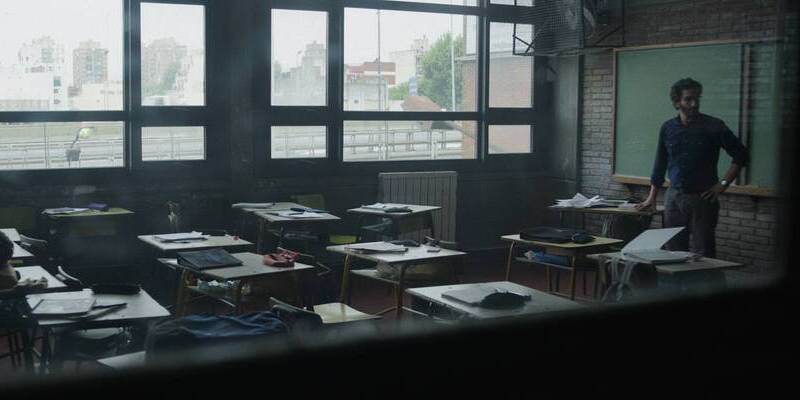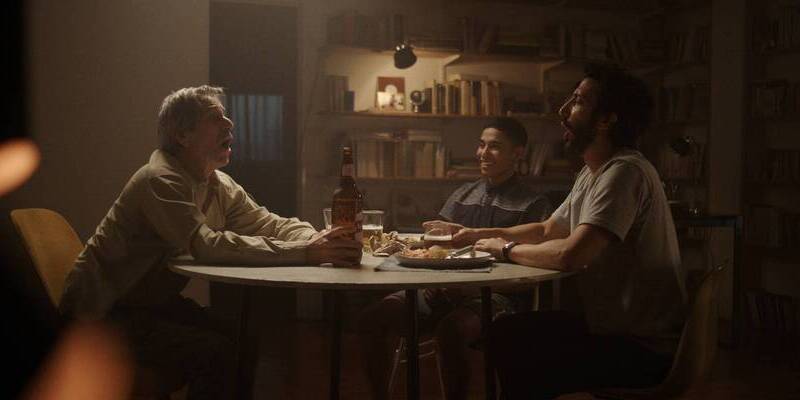
Review by
Eric Hillis
Directed by: Diego Lerman
Starring: Juan Minujín, Bárbara Lennie, Alfredo Castro, Rita Cortese, María Merlino

The concept of a committed teacher attempting to improve the lives of
pupils in a tough neighbourhood's high school is hardly new. If you've
seen anything from The Blackboard Jungle to
Dangerous Minds you'll know how this goes down. A new
teacher arrives at school and finds themselves faced with the mammoth
task of getting the kids interested in whatever subject they happen to
teach (more often than not it's literature, which allows for sequences
in which Teach compares Shakespeare to Snoop Dogg in an attempt to get
down with the kids), and usually find themselves embroiled in some sort
of local turf war.
Diego Lerman previously gave us another school drama in 2010's
The Invisible Eye and now returns to the chalkboard
jungles of Buenos Aires classrooms with The Substitute, a title already taken by a 1996 American variation on this theme
starring Tom Berenger.

Lerman ticks all the sub-genre's boxes: yes there's a determined
teacher who finds himself on a saviour quest to rescue a pupil from the
clutches of the local drug kingpin, and yes there's a scene where the
joy of poetry is communicated to the kids through rap, but what marks
The Substitute as something a little different is its lack
of sensationalism.
Played by Juan Minujin, substitute literature teacher Lucio is
as far from Robin Williams' inspiring poetry teacher as you could
imagine. He's grown cynical about the lack of interest in his field
among younger people, and arrives at a tough suburban Buenos Aires high
school with few ambitions beyond getting through the days and hopefully
helping at least some of his disinterested pupils to scrape a pass in
their exams.

Lucio's father (Alfredo Castro) however is very much the sort of
figure Robin Williams might have played. Known locally as "The Chilean",
he runs a centre that helps keep kids out of trouble by keeping them
busy with various projects. One of the kids under his charge is Dilan
(Lucas Arrua), a quietly intelligent boy who just happens to be
one of Lucio's pupils. Dilan is also dealing drugs for El Perro, a local
drug baron who has aspirations of becoming the neighbourhood's mayor.
When Dilan breaks the dealer's code by selling his product in school,
leading to the arrest of a fellow pupil, he finds himself hiding out
from El Perro, who wishes to punish him severely for jeopardising his
political ambitions. Needless to say, Lucio intervenes in an attempt to
save the boy.
As dramatic as the set-up reads, Lerman downplays his film's various
dramas. Unlike the sensationalist Hollywood movies it shares its general
premise with, The Substitute is a gritty and realistic
look at how this scenario might play out in real life. There's never any
chance of the mild-mannered Lucio standing up to the drug gang, so we
know we're not in for some ridiculous third act where he tools up and
mows them down while shouting catchphrases like "Class is dismissed!"
Instead we watch Lucio quietly wrestle with a situation that's far from
black and white. In helping his students, Lucio finds himself exposed to
a world that plays by different rules to his own middle class milieu. He
also finds himself in the shadow of his father, as the locals compare
him to his old man and expect him to deal with matters in the same
direct fashion, something the shy Lucio just isn't built for.

Along with the central narrative we get a sub-plot regarding Lucio's
attempts to make his 12-year-old daughter take the entrance exams for a
posh school she has no desire to attend. It's a nice touch on Lerman's
part to expose what is either hypocrisy or simple pragmatism on Lucio's
part in wanting his daughter to avoid sharing a school with the sort of
deprived kids he himself is fighting to defend. Ironically, while Lucio
gradually gets through to the kids in his class, he finds it a constant
struggle to connect with his own child.
Lerman peppers his drama with nicely observed small details, like how
Lucio almost puts his key in the front door of the house now occupied by
his ex-wife, only to correct his mistake and knock instead. Other
subplots, like Lucio's colleagues-with-benefits relationship with an
older female teacher and the reveal that his ex-wife has taken a lesbian
lover, are similarly downplayed and portrayed as commendably
matter-of-fact. When things do take a highly dramatic turn in a climax
that sees Lucio and Dilan fleeing from gun-wielding mobsters, Lerman
proves himself as capable of creating a suspenseful action sequence as
any of his Hollywood peers.


